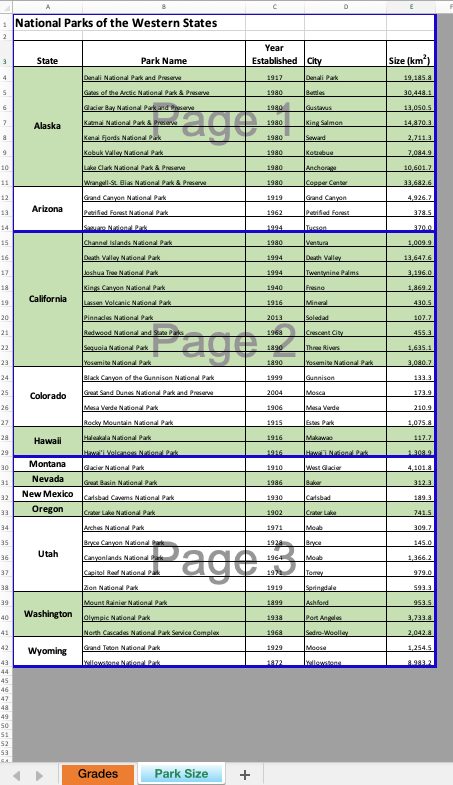3.4 Preparing to Print
Learning Objectives
- Locate and fix formatting consistency errors.
- Apply new formatting techniques.
- Use Print Titles to repeat rows and columns on each page of a multiple page worksheet.
- Control where page breaks occur in a multiple page worksheet.
In this section, we will review a worksheet for formatting consistency, as well as learn two new formatting techniques. This worksheet currently prints on four pages, so we will learn new page setup options to control how these pages print. A new data file will be used for this section.
REVIEWINGReviewing FORMATTINGFormatting FORFor CONSISTENCYConsistency
Open the “CH3-Gradebook and Parks” workbook if it isn’t already open.
Click on the “Park Size” sheet tab within your “CH3-Gradebook and Parks” workbook ![]() .
.
You have been given a spreadsheet with data about the national parks in the western United States. Your coworker formatted the workbook and has asked you to review it for consistency. You also need to prepare it for printing. Figure 3.26 shows how the second page of the finished worksheet will appear in Print Preview.
REVIEWING FORMATTING FOR INCONSISTENCIES
The first thing you are going to do is review the worksheet for formatting inconsistencies.
- Scroll through the worksheet and locate the following formatting errors:
- The formatting of the Utah label does not match the other states.
- The Year Established values for Hawaii are not center aligned like the other years.
- The cells for the Nevada data should have the same green fill color as the other alternating states.
- The number of digits after the decimal place for the Size values is inconsistent. Also, these values should be formatted with Comma style to make them easier to read.
- To fix these errors, complete the following steps:
- Merge & Center A34:A38. Change the font size to 16 and apply Bold format.
- Center align C28:C29.
- Apply the green fill color to A31:E31 (be sure to match the green fill color of the other states).
- Select E4:E43 and apply Comma Style. Use Increase Decimal and/or Decrease Decimal until one digit appears after the decimal place for all values.
- While you’re fixing errors, proofread the sheet and correct any typos.
- Finally, let’s add color to the two sheet tabs. The use of colored tabs assists in navigating between sheet tabs.
- Right-click the “Park Size” sheet tab (
 Mac users hold down Ctrl key and click the sheet tab)
Mac users hold down Ctrl key and click the sheet tab) - Point to Tab Color and choose a “blue” color.
- Now right-click the “Grades” sheet tab, point to Tab Color and choose an “orange” color. That’s it!
- Right-click the “Park Size” sheet tab (
FINE-TUNING FORMATTINGFormatting
Now that you have fixed the inconsistencies in the formatting, you decide to apply some formatting techniques to make the worksheet look even better. You are going to start by vertically aligning the names of the states within the cells.
The next new formatting skill is to change the label in E3 from Size (km2) to Size (km2) with the 2 after km formatted with superscript.
- Double-click on cell E3 to enter Edit mode
- Select just the 2 (be careful not to select anything else).
- On the ribbon (Home tab) click the dialog box launcher arrow in the Font group.
 Mac Users: there is no dialog box launcher for Excel for Mac. Instead, choose Format from the Menu Bar, click Cells:
Mac Users: there is no dialog box launcher for Excel for Mac. Instead, choose Format from the Menu Bar, click Cells: 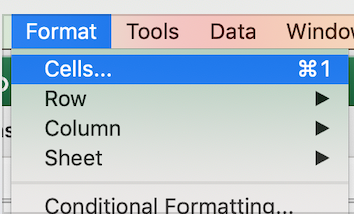 then continue with Steps 4 and 5
then continue with Steps 4 and 5 - In the Effects section of the Format Cells dialog box, check the box for Superscript (see Figure 3-27). Click OK.
- Save the CH3 Gradebook and Parks file.
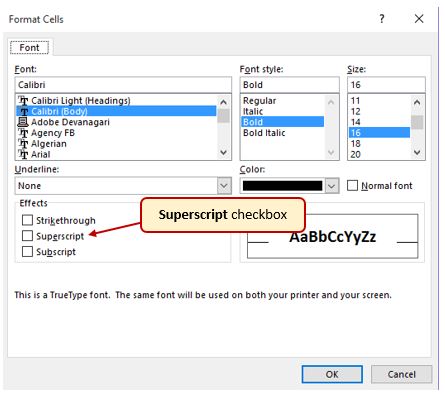
REPEATINGRepeating COLUMNColumn (ANDAnd ROW)Row) LABELSLabels
Now that you have fixed the cell and text formatting, you are ready to review the worksheet in Print Preview. You will notice that the worksheet is printing on multiple pages, and you cannot tell what each column of data represents on some of the pages.
- With the CH3-Gradebook and Parks file still open, and the Parks tab selected, go to Backstage View by clicking the File tab on the ribbon. Select Print from the menu.
 Mac Users: choose File from the Menu Bar, and then choose Print
Mac Users: choose File from the Menu Bar, and then choose Print - Click through each of the pages. The worksheet is currently printing on four pages (
 Mac users may only see three pages but that is ok), with the City and Sizes columns printing on separate pages from the rest of the data.
Mac users may only see three pages but that is ok), with the City and Sizes columns printing on separate pages from the rest of the data. - Change the Orientation from Portrait to Landscape. This fits all of the columns on one page. All of the columns are now on the same page, but the second and third pages have no column labels to identify what information is in each column. You are going to use Print Titles to repeat the first three rows of the worksheet on each of the printed pages. To set Print Titles you need to exit Print Preview.
- Exit Backstage View then click the Page Layout tab on the ribbon.
- Click the Print Titles button in the Page Setup group on the ribbon. The dialog box shown in Figure 3.28 should appear.
- Click the Sheet tab if necessary.
- Click in the Rows to repeat at top: box. Be sure your insertion point is blinking in that box before moving on to the next step.
- In the worksheet, select Rows 1 through 3. The text $1:$3 should now appear in the Rows to repeat at top: box.
- Click OK.
You will not see a change to the worksheet in Normal view, so you will need to return to Print Preview. While looking in Print Preview, you will notice that the pages are breaking in inconvenient places.
- Go to Print Preview and look at each of the pages. Notice that the first three rows are now repeated at the top of each page.
- Exit Backstage View.
Skill Refresher
Creating Print Titles
- Open the Page Setup dialog box and click the Sheet tab.
- Click in the Rows to repeat at top: box or the Columns to repeat at left: box.
- Click in the worksheet and select the row(s) or column(s) that you want to repeat on each page.
INSERTINGInserting PAGEPage BREAKSBreaks
Notice that the data for California is split between the first and second pages. You want all of the data for each state to be together on the same page, so you need to control the page breaks. You are going to start by inserting a page break before the California data to force it to start on the second page, then you will move the page break for the third page if needed. To make these changes you are going to work in Page Break Preview.
- Click the View tab on the ribbon then click Page Break Preview in the Workbook Views Group. Your screen should look similar to Figure 3.29.
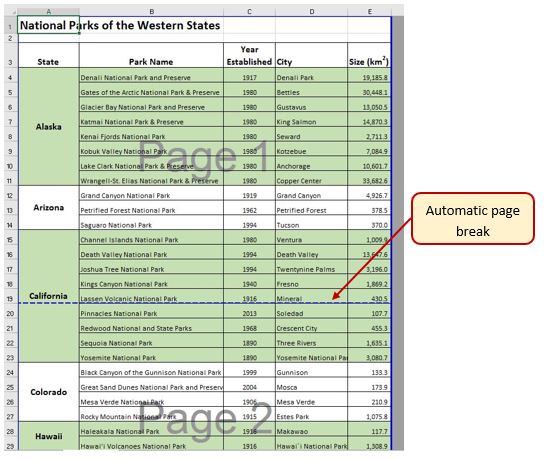
![]()
![]() Mac Users: in the next paragraph below, the location of the automatic page breaks may be in different locations. That’s ok.
Mac Users: in the next paragraph below, the location of the automatic page breaks may be in different locations. That’s ok.

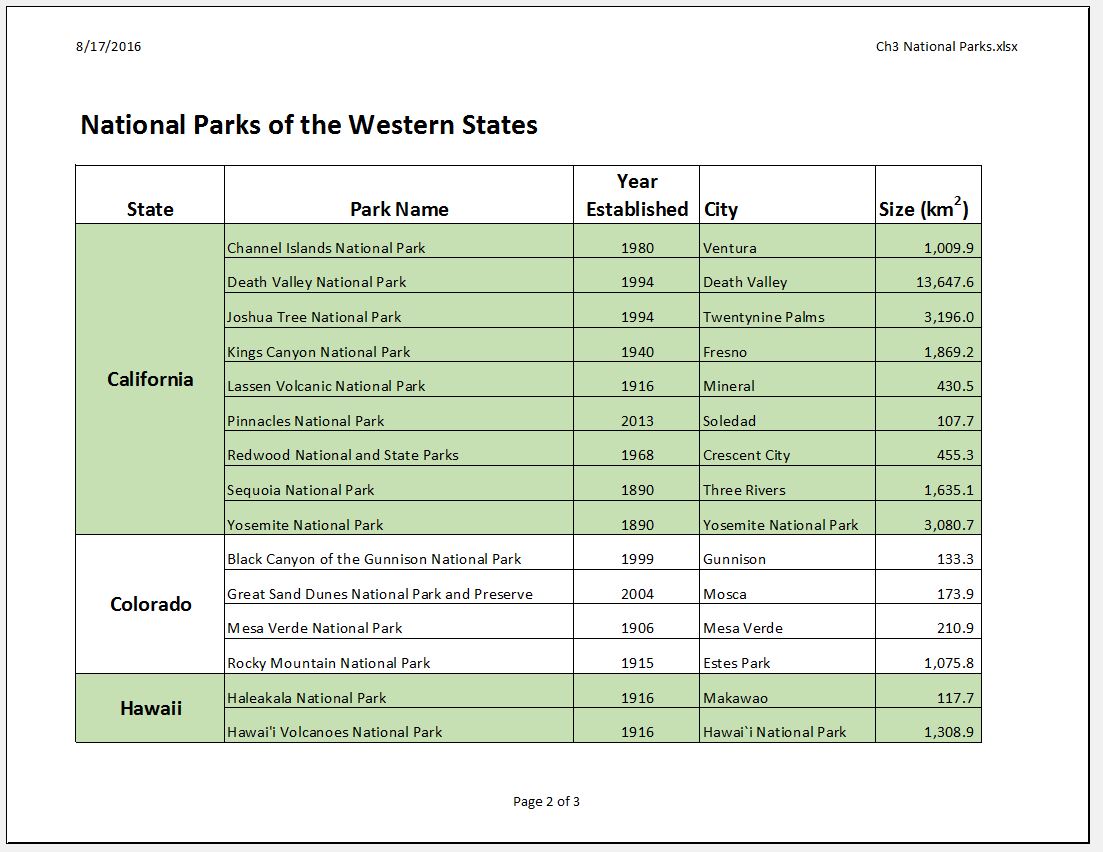

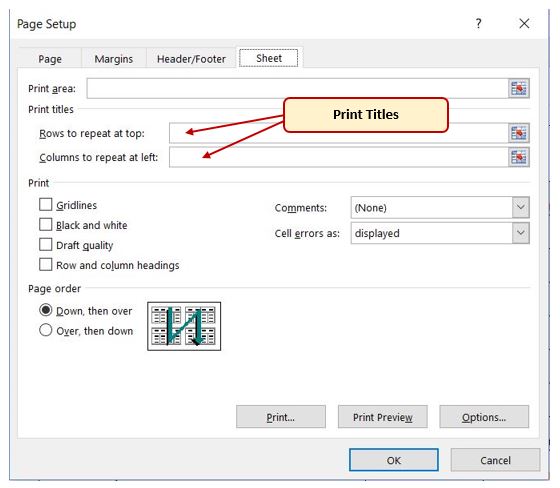
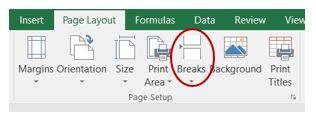
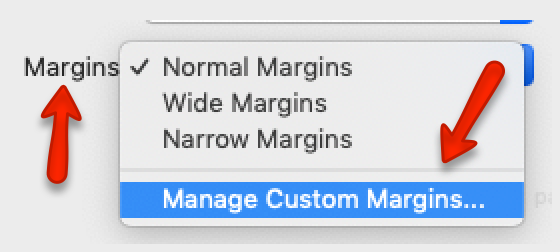

![Completed Footer formula centered: Page & [Page] of & [Pages].](https://openoregon.pressbooks.pub/app/uploads/sites/152/2020/06/image31-2.jpg)
